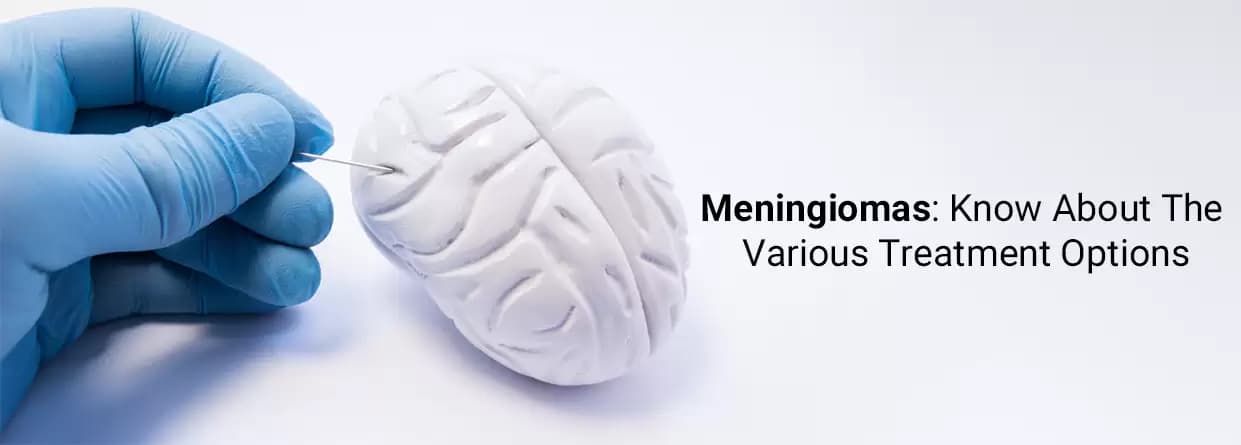
Meningioma is a medical condition that leads to a tumor in the primary central nervous system. Meningiomas affect the meninges, which is a membrane that surrounds the brain and spinal cord.
Meningioma is a medical condition that leads to a tumor in the primary central nervous system. Meningiomas affect the meninges, which is a membrane that surrounds the brain and spinal cord. Most meningioma symptoms occur gradually. The condition remains unknown to patients due to the gradual development of the symptoms. This is why early detection of the condition becomes important. The condition usually affects the nearby brain tissues, nerves, or vessels which can increase the risk of serious disability.
While meningiomas are common in women at an older age, the condition can occur to anyone at any age. This blog contains information regarding treatment options for meningiomas and how you can manage the symptoms. However, this blog is only for reference purposes, and it is important to consult the best neurologist doctor in Kolkata to choose the most effective meningioma treatment.
Before surgery, it is important to assess the severity of meningioma symptoms and choose the best treatment option. The doctor examines the medical history report and recommends several diagnostic tests. Diagnosis for meningioma includes a CT scan, and MRI to generate images of the affected region.
Further, if the surgery of scheduled, the doctor may provide pre-surgery tips to help you prepare for the procedure. It is important to discuss your history of medications, medical disorders, and allergies to certain chemicals like anesthesia with the doctor before the procedure to ensure minimal complications.
The treatment of meningiomas depends on several factors the size and location of the meningioma, the severity of the symptoms, the age and overall health of the patient, and the outcome of the procedure. The doctor may recommend watchful waiting for patients with mild to moderate signs and meningioma symptoms. If the doctor does not observe any signs of complications, periodic brain scans, and regular evaluations can help manage the condition.
In case the doctor suspects the progression of the disease, several treatment options such as drug management, surgical intervention, and radiation therapy, can be effective for long-term results. The doctor investigates the severity of the meningiomas before performing the surgery. Since meningiomas occur near delicate structures in the brain and spinal cord, it is not always feasible to remove the entire tumor. Therefore, depending on the procedure, the neurologist may recommend further treatment if -
Radiation therapy is recommended when the meningiomas cannot be completely removed via surgical intervention. The goal of radiation therapy is to eliminate any remaining meningioma cells after the surgery and subsequently, reduce the risk of recurrence. The surgeon aims high-powered energy beams at the tumor cells using a large machine. Radiation therapy for meningioma treatment involves the following options -
In rare cases, drug therapy or chemotherapy is recommended for the treatment of meningiomas. Chemotherapy is usually responsive in cases, surgery and radiation therapy do not respond to the treatment. The long-term benefits of chemotherapy for meningioma treatment are still under debate. But researchers are currently investigating other treatment options.
Meningioma symptoms vary from one patient to another and are usually gradual. Depending on the location of the brain, meningiomas can lead to the following -
Suprasellar meningioma is a type of meningioma that is located near the area of the skull where the pituitary gland is found.
Doctors classify different types of meningiomas based on their characteristics. Molecular testing can help identify subtypes of meningiomas which include the following -
There are several factors that contribute to the causes of meningiomas -
Yes, untreated or chronic meningiomas can cause several complications including -
Written and Verified by:

Dr. Mahendra Kumar Manocha is a Consultant in Neuro Medicine Dept. at CMRI, Kolkata, with over 25 years of experience. He specializes in diagnosing and treating neurological disorders, including epilepsy, stroke, and multiple sclerosis.
Similar Neuro Sciences Blogs
Book Your Appointment TODAY
© 2024 CMRI Kolkata. All Rights Reserved.